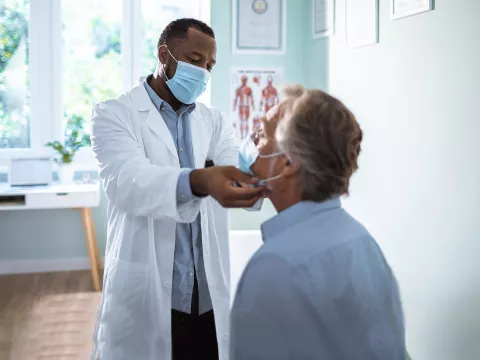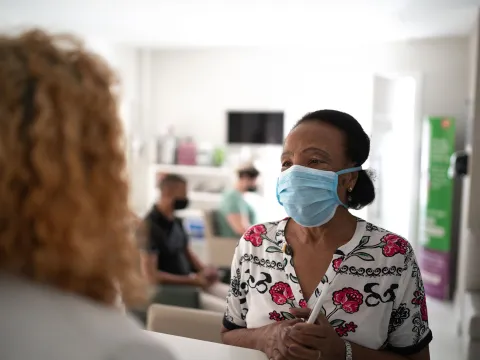- AdventHealth

Getting a colonoscopy every 10 years starting at age either age 45 or 50 (depending on your risk factors) is the single best thing you can do to prevent colon cancer. But what if the test reveals cancer is already present? What happens next?
Being diagnosed with colon cancer can be frightening, but with routine colonoscopies, the hope is that any cancer that’s detected is caught in its early, most treatable stages.
The good news about a colonoscopy is that it is both preventive and diagnostic, so it can help prevent colon cancer by finding and treating polyps, while also taking biopsies of polyps to diagnose colon cancer all with one procedure.
That’s one reason why AdventHealth experts are so passionate about advocating for colon cancer screenings through routine colonoscopies — the “gold standard” for colon cancer detection.
"There are many cases of colon cancer that could have been prevented or caught at an early stage if people underwent appropriate screening and/or followed up on a recommendation for further testing or treatment based on their screening test results" says gastroenterologist Mariam Naveed, MD.
How Screening Works
Colon cancer screening isn’t just for people who might have a concern. It’s just as important for people who are healthy, even if you don’t have any symptoms.
Dr. Naveed advises, "We recommend initiating screening between the ages of 45 and 50 years in most average risk adults. Some clinicians initiate screening for average-risk African American adults at age 45 years, taking into account the higher incidence of colon cancer among African Americans. Some individuals at higher risk - including those with certain digestive disorders such as Ulcerative colitis or Crohn's disease or those who have a family history of colon cancer or polyps - might be recommended to test even earlier."
The power of a colonoscopy is twofold: It can spot cancer early and it can even prevent cancer entirely. This is because polyps turn into colon cancer slowly, usually over years. During a colonoscopy, which involves the use of a narrow flexible tube to inspect the colon and intestines, the doctor can often remove these polyps.
"There are three major screening type tests available for colon cancer: stool-based versus colonoscopy versus radiographic testing," explains Dr. Naveed. "Specific screening tests have particular strengths or weaknesses in detecting precancerous lesions and early stage cancer. As a gastroenterologist, I consider colonoscopy to be the best screening test for several reasons. It is the only screening test that screens for and prevents colorectal cancer. If your doctor finds a colon polyp during your colonoscopy, he or she can prevent it from turning into cancer by removing it. Removing polyps early eliminates the chance that colon cancer will develop from those precancerous growths or polyps."
Dr. Naveed continues, "Furthermore, if you are average risk and have a normal colonoscopy, you may not need another colonoscopy or screening test for another 10 years. Lastly it is important to know that any positive (abnormal) screening test for colon cancer, other than colonoscopy itself, requires a timely colonoscopy to evaluate for precancerous lesions and colon cancer. That being said at the end of day, we all believe that the best test is the one that the patient is willing to complete and gets done according to the test instructions," affirms Dr. Naveed.
Some people are afraid of getting a colonoscopy, but the experience has improved greatly in recent years. The preparation typically involves a laxative the day before the procedure with a sports beverage to wash it down and keep the body’s electrolytes in balance.
The procedure itself happens under sedation; most patients aren’t aware it’s even happening. Though a colonoscopy by itself can’t diagnose colon cancer — a lab report is needed for that — it can provide strong evidence.
Colon Cancer Surgery: What to Expect
According to Colon and Rectal Surgeon, Justin Kelly, MD, “Treatment of colon and rectal cancer depends on a multidisciplinary approach. Each patient has a tailor-made treatment plan which can include surgery, radiation, chemotherapy. Every patients' unique case is discussed at our weekly rectal cancer tumor board which has received national recognition of excellence from the Commission on Cancer certification through the National Accreditation Process in Rectal Cancer.”
At AdventHealth, it’s often conducted with the assistance of a robot guided by a surgeon. The “robot” is a machine with arms that the surgeon controls from a nearby console. It operates with the precision and flexibility that surpasses what a human can do alone.
Dr. Kelly adds, “A minimally invasive approach, both laparoscopic and robotic, offers many benefits to patients undergoing surgery including less scarring, lower hernia rate, less pain and less time spent in the hospital. Our dedicated surgeons are now trained to preserve sphincter function and avoid permanent ostomies, if feasible.”
Combined, these advantages can result in faster recovery for patients after surgery. There are additional methods to help patients recover more quickly, including limiting the use of opioids. When doctors scale back on opioids, patients don’t have to fast before surgery, which helps them have more strength after surgery and allows them to get active sooner. And, the sooner you are up and moving, the better it is for your recovery.
If lab analysis of the tumor suggests some cancer cells may have spread, then surgery may be followed up with chemotherapy. Even if the cancer has been successfully treated, patients are followed very closely for five years for monitoring.
Having Faith
For many patients, faith in God is a key element of resilience. In addition to their expertise in treating patients’ cancer, AdventHealth’s caregivers also tend to their mind and spirit. Our mission of extending the healing ministry of Christ while providing whole-person care is at the core of our care. Our care teams are committed to ensuring you feel cared for throughout the entire process.
If a patient wants to pray, the care team is happy to pray with them. Chaplains are also available to provide spiritual guidance and support as patients work their way through the treatment and recovery process.
Schedule Your Screening Today
Early detection is key to protecting your life and helping you stay healthy for years to come. Schedule your screening today to help protect your whole health.





